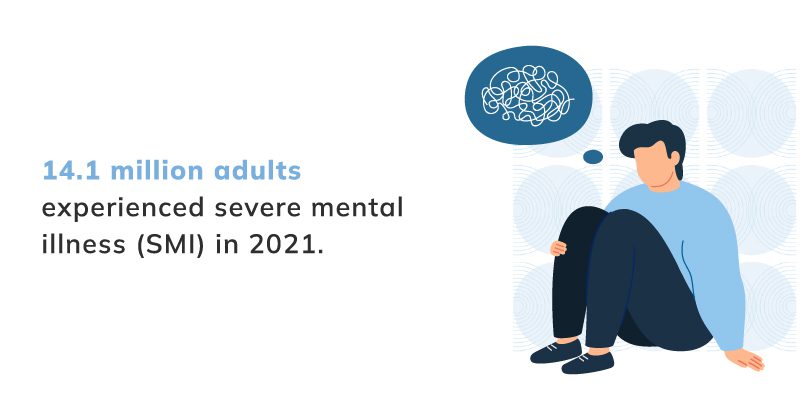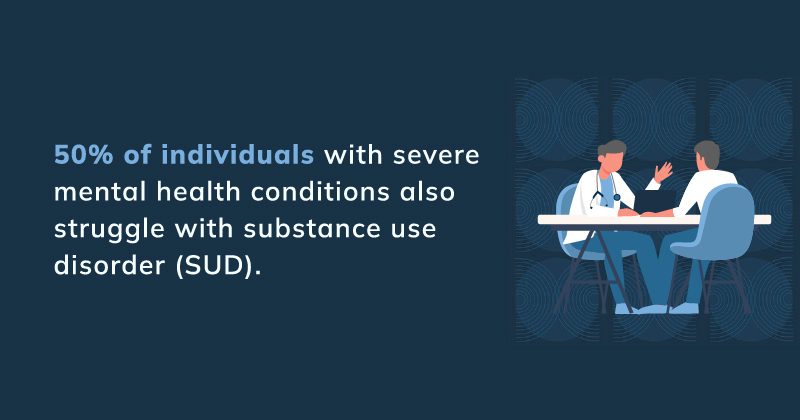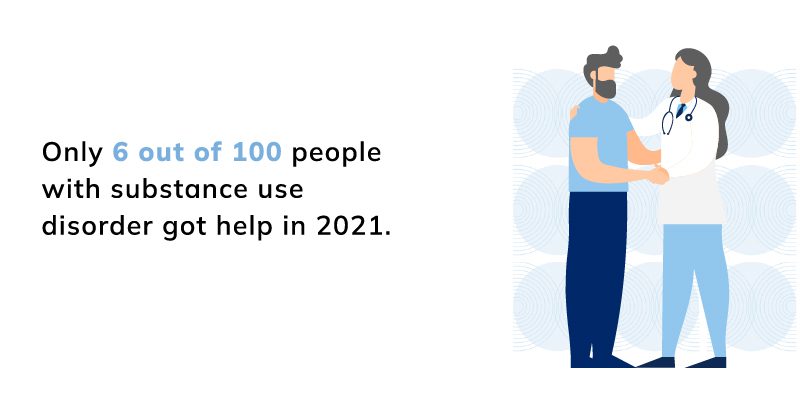Psychological Dependence Definition: A Comprehensive Overview
Learn about the psychological dependence definition, symptoms, and risks associated with addictive behaviors here.

How Is Psychological Dependence Defined?
The psychological dependence definition is complex. It refers to the emotional attachment a person has toward a substance due to repeated use. It’s characterized by an intense craving for the substance.
It often results in symptoms such as:
- Anxiety
- Depression
- Agitation
29.5 million people battled alcohol use disorder (AUD) in 2021, stemming from a physical and psychological dependence.1
What is Alcohol Use Disorder?
Importance of Understanding Psychological Dependence
Psychological dependence is a common factor in addiction. Understanding psychological dependence definition is crucial in developing effective treatment plans.
These plans can address both the physical and emotional components of addiction.
What is Psychological Dependence on a Substance?
3.6 million adults reported having a mental health disorder co-occurring with a substance use disorder in 2021.2
The psychological dependence definition refers to the emotional and mental reliance on a substance. This is due to its effects on the brain.
Changes Caused by Dependence
Dependence on a substance leads to behavioral and emotional changes. These changes include anxiety, irritability, and depression when it is unavailable.
It can also make it difficult for people to quit using the substance without medical help.

Understanding the Difference: Physical vs. Psychological Dependence Definition
The differences between physical and psychological dependence definitions will be detailed below.
Differences in Physical and Psychological Dependence Definitions
Psychological dependence happens when a person relies on a substance to feel good. It’s characterized by intense cravings or compulsions to use the substance.
How Does Physical Dependence Happen?
Physical dependence is a result of changes in the brain and body. This occurs with long-term substance use. It’s marked by withdrawal symptoms that happen when substance use stops.
Understanding the psychological dependence definition requires a precise understanding of this difference.
Nature of Dependence
Psychological dependence is based on an emotional attachment to a substance or behavior. That’s why it is more subjective in nature. It is often tied to:
- Stress relief
- Coping mechanisms
- Pleasure seeking
How Is Physical Dependence Different?
Physical dependence is a physiological response to a substance or behavior. It’s rooted in changes that occur within the body and brain.
This difference is important for understanding the psychological dependence definition.
Interconnectedness
Psychological and physical dependence are connected. They can influence each other.
Psychological dependence can lead to physical dependence. This happens when a person keeps using substances to avoid withdrawal symptoms.
This point must be considered when understanding psychological dependence definition.
Symptoms and Effects
Since psychological dependence is subjective in nature, symptoms are often difficult to identify. It is often characterized by:
Emotional distress
- Anxiety
- Depression
- Mood swings
Physical Withdrawal Symptoms
Physical dependence shows withdrawal symptoms. These often include:3
- Nausea
- Vomiting
- Sweating
- Shaking
Treatment
Psychological dependence gets treated with:4
- Therapy
- Support groups
- Behavioral interventions
These treatments address the underlying emotional issues driving the addiction.
Treatment of Physical Dependence
Physical dependence often requires medication-assisted treatment. MAT can help manage withdrawal symptoms.
This difference is important for understanding the psychological dependence definition.
Relapse Risk
The relapse risk varies depending on various factors. These may include individual circumstances and the specific substance or behavior involved.
Psychological Dependence Relapse Risk
Psychological dependence generally has a higher relapse risk compared to physical dependence. This is because psychological dependence involves:
- Persistent craving
- Obsessive thoughts
- Emotional disturbances
This is true even after you have addressed physical dependence.
How to Reduce the Risk of Relapse
To reduce the risk of relapse, it’s important to address these psychological factors. It’s crucial to develop effective coping strategies.
This difference is important to remember when understanding the psychological dependence definition.
Long-Term Effects
Both types of dependence have serious long-term effects. Psychological dependence is often associated with co-occurring mental health conditions. It can also lead to:
- Relationship problems
- Financial struggles
- Legal issues
Long-Term Effects of Physical Dependence
Physical dependence can lead to:5
- Organ damage
- Cognitive impairment
- Overdose
It is crucial to know this difference when understanding the psychological dependence definition.

What Are the Risk Factors for Developing Psychological Dependence?
Various risk factors contribute to the development of psychological dependence. Understanding these factors can help individuals take steps to prevent and address addiction.
Family History
Family history plays a role in the psychological dependence definition. Having a family member with an addiction increases the risk of psychological dependence.
Genetic factors also contribute to a person’s susceptibility to addictive behaviors.6
Brain Chemistry
Changes in brain chemistry can lead to psychological dependence.
Chemical Imbalances
Imbalances in brain chemicals make people want things that make them feel good. These imbalances include low dopamine levels. As a result, they may seek substances or behaviors for temporary pleasure or relief.
Neurotransmitter Changes
Changes in neurotransmitter systems can also influence the development of psychological dependence. Examples may include the reward pathway.
Early Life Experiences
Some early life experiences can increase the risk of developing psychological dependence.
Child Abuse and Neglect
Bad experiences in childhood can affect mental health. These experiences include:
- Abuse
- Neglect
- Trauma
They can raise the chances of developing psychological dependence.
Unstable Home Environment
Chaotic or unstable family environments contribute to unhealthy coping strategies. They can result in a higher likelihood of engaging in substance use.
Consider early life experiences as a crucial factor in exploring psychological dependence definition.
Peer Influence
Peer influence can shape an individual’s susceptibility to psychological dependence.
Being surrounded by peers who engage in substance use can lead to dependence. They affect one’s perception of norms. This can result in initiating and maintaining addictive behaviors.
Peer influence plays a critical role in understanding the psychological dependence definition.
Social and Cultural Factors
Social and cultural factors play a role in developing psychological dependence.
Cultural norms that normalize substance use can develop psychological dependence.
Drug Accessibility
Accessibility of substances influences the initiation and continued engagement. This is particularly true in environments where drugs are more accessible.
Co-Occurring Mental Health Disorders
People with underlying mental health conditions are vulnerable to developing psychological dependence. These conditions include:7
- Anxiety
- Depression
- Trauma-related disorders
Self-Medication
Substance use may act as self-medication or a way of coping with distressing symptoms.
Don’t overlook co-occurring mental health disorders when studying psychological dependence definition.
Personality Traits
Personality traits can increase the likelihood of seeking out instant gratification. These traits include impulsivity, sensation-seeking, or low self-esteem.
Struggles with Emotional Regulation
Difficulty in managing stress and emotional regulation can also lead to psychological dependence.
Cognitive Factors
Distorted thinking patterns can contribute to the development and maintenance of psychological dependence. Examples of these patterns include rationalizing substance use or minimizing consequences.
Perceived Benefits of Substance Use
Beliefs about the perceived benefits of addictive behaviors can influence their continued use. Always factor in cognitive factors when delving into the psychological dependence definition.

Which Substances Are Most Likely to Lead to a Psychological Dependence?
Below are some substances that lead to psychological dependence.
Opioids
Opioids are potent substances that get prescribed for pain relief.
How Opioids Work
They act on the brain’s opioid receptors. They produce feelings of euphoria and pain reduction. But, their misuse can lead to psychological dependence.
Examples of Opioids
Examples of opioids include:
- Prescription opioids such as oxycodone, hydrocodone, and morphine
- Illicit opioids such as heroin and fentanyl
Opioids are an essential element in analyzing the psychological dependence definition.
Alcohol
Alcohol consumption can lead to psychological dependence. This is due to the euphoria and relaxation it produces.
Alcohol Tolerance and Addiction
Over time, the body develops a tolerance. This means a person needs more of the substance to achieve the same effect.
Prolonged use of drugs and alcohol can lead to addiction. It is a severe form of psychological dependence.
It’s important to keep the use of alcohol in mind when studying the psychological dependence definition.
Alcoholism: Causes, Symptoms, Diagnosis, Treatment, and Pathology
Stimulants
Stimulants are substances that increase alertness, attention, and energy levels. They stimulate the central nervous system and can produce a sense of euphoria.
Types of Stimulants
This euphoria leads to potential psychological dependence. Examples of stimulants include:
- Amphetamines, such as Adderall and methamphetamine
- Cocaine
- Synthetic stimulants like synthetic cathinone (“bath salts”) and synthetic cannabinoids (“spice”)
Don’t overlook stimulants when studying the psychological dependence definition.
Sedatives and Benzodiazepines
Sedatives and benzodiazepines are central nervous system depressants. Doctors prescribe them to treat anxiety, insomnia, and certain medical conditions.
Types of Sedatives and Benzos
They can induce relaxation and sedation, which can lead to psychological dependence. Examples of sedatives and benzodiazepines include:
- Barbiturates like phenobarbital
- Benzodiazepines such as alprazolam (Xanax), diazepam (Valium), and lorazepam (Ativan)
Sedatives are key aspects to consider when delving into the psychological dependence definition.
Cannabis
Cannabis is a psychoactive substance that alters perception, mood, and cognition. It is also known as marijuana or weed. While it may not show severe symptoms, its abuse can cause psychological dependence.
Cannabis Use Disorder
Can a Person Become Dependent on Activities Like Gambling or Shopping?
Activities like gambling and shopping can trigger pleasurable feelings and relieve stress. This can lead to:
- Gambling Addiction: When someone is dependent on gambling, they may feel excited when they win. They might also feel sad or anxious when they lose. They may spend a lot of time and money on gambling and have trouble controlling themselves.
- Shopping Addiction: Someone dependent on shopping may feel a strong urge to buy things. They might keep buying things even if it makes them broke or causes conflicts.
These dependencies can be harmful to a person’s well-being. They may require professional help to overcome them.
Symptoms and Side Effects of Psychological Dependence
Understanding the symptoms of psychological dependence is crucial for early recognition and intervention.
Behavioral Symptoms
Psychological dependence can manifest through various behavioral changes. Below are some common behavioral symptoms.
Increased Preoccupation
This includes spending too much time thinking about the substance or behavior.
Loss of Control
Loss of control means being unable to limit or control the use or engagement in the activity.
Neglecting Responsibilities
This looks like prioritizing the substance or behavior over:
- Work
- Relationships
- Personal obligations
Continuing Use Despite Consequences
This means persisting with the substance despite adverse effects. These effects can include:
- Physical health
- Mental well-being
- Relationships
Withdrawal from Social Activities
A common behavioral change is isolating oneself from friends, family, and hobbies. It also means giving preference to a substance or behavior.
One must consider behavioral symptoms while studying the psychological dependence definition.
Emotional Symptoms
Psychological dependence can have a profound impact on a person’s emotional well-being.
Some emotional symptoms associated with psychological dependence include:
- Mood swings: Experiencing rapid shifts in emotions, from euphoria to irritability or anxiety
- Anxiety: Feeling restless or on edge when unable to engage in the substance or behavior
- Cravings: Experiencing intense desires to use the substance or engage in the behavior
- Irritability or agitation: Becoming frustrated when unable to access the substance or behavior
- Depression: Feeling down, hopeless, or withdrawn when not engaging in the activity
When analyzing the psychological dependence definition, emotional symptoms become a crucial factor.
Cognitive Symptoms
Psychological dependence also affects cognitive functioning and thought patterns. Here are some cognitive symptoms associated with psychological dependence:
- Thinking about the substance or behavior
- Lack of focus on other tasks
- Develop irrational beliefs to maintain the use or engagement in the activity
- Loss of interest in activities or hobbies
- Engaging in risky behaviors to continue using the substance
- Struggling to resist cravings and experiencing a sense of powerlessness
Cognitive symptoms are important to consider when exploring the psychological dependence definition.
How Is Psychological Dependence Diagnosed by Mental Health Professionals?
Mental health professionals often diagnose and treat psychological dependence using various methods.
Diagnosing Psychological Dependence
Diagnosing psychological dependence involves a comprehensive assessment conducted by mental health professionals. Here are the key steps:
Behavioral Assessments
Healthcare professionals use behavioral assessments. These assessments ask a patient to answer different questions.
These questions are about their addictive behavior, triggers, and withdrawal symptoms. Mental health professionals use this information to determine the severity of dependence.
Physical Evaluations
Mental health professionals also perform physical evaluations to diagnose psychological dependence. They may test a patient’s vital signs and look for physical signs of addiction.
These signs include:
- Needle marks
- Scars
- Weight loss
These evaluations help determine the severity of the addiction. It also helps them decide what kind of treatment is necessary.
Interviews and Therapy Sessions
Another method of diagnosing psychological dependence is through interviews and therapy sessions.
Professionals may sit down with a patient and ask questions about their addiction. The aim is to support the patient as they explore the root of their addiction.
This may help patients gain insight into their behavior. They can learn new, healthier coping strategies.
Treatment of Psychological Dependence
Treating psychological dependence involves a combination of therapeutic interventions and support systems. Below are some of the most common approaches.
Psychotherapy
Professionals use different types of therapies to help individuals with psychological dependence.
Cognitive-Behavioral Therapy (CBT)
This therapy helps individuals identify and change negative thought patterns. These are patterns associated with psychological dependence.
CBT focuses on developing healthier coping strategies and building resilience.
Motivational Interviewing
This counseling technique helps individuals explore their ambivalence towards change. It helps them find the motivation to overcome psychological dependence.
Outdoor Adventure Therapy
This therapy complements traditional methods. It uses outdoor activities to promote personal growth.
It offers physical challenges, emotional exploration, and skill development in a natural setting. Trained professionals guide participants in this nature-based approach.
Medication
In some cases, medication gets prescribed to manage co-occurring mental health conditions.
But, there are no specific medications approved for treating psychological dependence itself.
Peer Support Groups
Support groups offer a sense of community and understanding for individuals. They provide a platform to receive support from others facing similar challenges.
Examples include Alcoholics Anonymous (AA) and Narcotics Anonymous (NA).
These treatment options play a crucial role in understanding the psychological dependence definition.

Long-Term Effects of Psychological Dependence on Physical and Mental Health
Psychological dependence can have significant long-term effects. Some of these effects include:
- Increased risk of cardiovascular, liver, and respiratory issues
- Poor nutrition and weight management
- Weak immune system
- Development or exacerbation of anxiety, depression, and mood disorders
- Memory problems, difficulty concentrating, and reduced problem-solving abilities
- Social isolation and strained relationships due to behavioral changes
- The decline in quality of life and decreased life satisfaction
- Financial difficulties result from excessive spending on substances
- Legal issues related to substance abuse or addictive behaviors
How to Support and Encourage Loved Ones in Psychological Dependence Treatment
Support from friends and family members can play a vital role in the recovery journey. Below are some ways they can provide support.
Show Empathy and Understanding
Be patient and non-judgmental. Try to offer a listening ear to the individual experiencing psychological dependence.
Educate Yourself
Learn about psychological dependence to understand its challenges better. Learn how to provide appropriate support.
Encourage Professional Help
Motivate individuals to seek professional help from mental health experts. These experts should specialize in addiction and psychological dependence.
Attend Therapy Sessions
Offer to go with the person to therapy sessions or take part in family therapy sessions. This will show support and understanding from your side.
Attend Therapy Sessions
Offer to go with the person to therapy sessions or take part in family therapy sessions. This will show support and understanding from your side.
Create a Supportive Environment
Foster a safe and substance-free home environment. You can do this by removing triggers and providing encouragement for healthy activities.
Reinforce Positive Behavior
Acknowledge and praise the person’s progress and efforts in their recovery journey.
Set Boundaries
Establish clear boundaries to protect yourself and your relationship while still offering support.
Practice Self-Care
Take care of your own physical and emotional well-being. It will help you to maintain your ability to provide support and be a positive influence.
Never ignore the significance of these tips when learning the psychological dependence definition.
How Can Choice House Help Individuals With Psychological Dependence?
Choice House offers invaluable support to individuals grappling with psychological dependence. We address the specific needs of each person with our comprehensive services. Our goal is to guide them toward recovery.
What Treatment Looks Like at Choice House
Trained professionals at Choice House provide a safe environment for patients. We want them to explore and understand the underlying causes of their problems.
Our professionals use evidence-based practices and therapeutic techniques. These include therapies such as:
- Cognitive-behavioral therapy
- Art therapy
- Dialectical behavioral therapy (DBT)
- Motivational interviewing (MI)
- Psychoeducational groups
- Trauma therapy
- Outdoor adventure therapy
Reach Out Today
At Choice House, we aim to provide compassionate care. We want to empower men with the tools they need to achieve lasting recovery. Contact us now to get started.
Resources
- https://www.samhsa.gov/data/sites/default/files/reports/rpt39443/2021NSDUHNNR122322/2021NSDUHNNR122322.htm
- https://www.samhsa.gov/data/sites/default/files/reports/rpt29393/2019NSDUHFFRPDFWHTML/2019NSDUHFFR090120.htm
- https://www.webmd.com/mental-health/addiction/tolerance-dependence-addiction-explained
- https://www.healthline.com/health/psychological-addiction#treatment
- https://nida.nih.gov/publications/drugs-brains-behavior-science-addiction/drug-misuse-addiction
- https://nida.nih.gov/publications/drugfacts/genetics-epigenetics-addiction
- https://nida.nih.gov/publications/research-reports/common-comorbidities-substance-use-disorders/part-1-connection-between-substance-use-disorders-mental-illness
